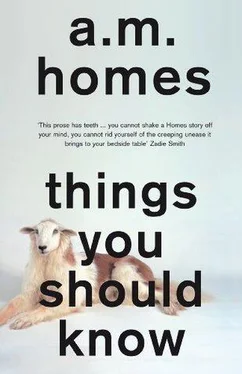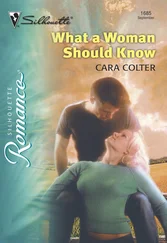“Ah,” Sherika says, “look at that.”
It is small, dingy, and a little otherworldly. There are wire racks for shelves, and things floating in tubs filled with melting ice — none of it incredibly clean. Mrs. Ha scurries around collecting tins of spices, bottles of vinegar. She seems happy, like she has recovered herself, she is chatting with the man behind the counter.
She shows me fresh vegetables: water chestnuts, shanghai cabbage, “Bau dau gok,” she says, — “snake bean.” Lotus leaves, brown slab sugar, and now she is in the freezer case, handing me a bag that says FROZEN FISH BALLS. She hands me others with writing in Chinese. “Fatt choy?” she asks the man behind the counter, and he points toward it.
“What is it?” I ask.
“Black moss,” she says.
“What is it really?” I ask.
She shrugs.
I want Mrs. Ha to feel comfortable. If pressed seaweed is to her what mashed potatoes are to me, I want her to have ten packages. Why not? I start picking things off the shelf and offering them to her.
She shakes her head and continues shopping.
The man behind the counter says something and she laughs; I am sure it is about me. I hear something about three Georges, about water, and then a lot of clucking from Mrs. Ha. He talks quickly, flipping back and forth from Chinese to broken English. She answers — her speech, suddenly rhythmic, her accent shifting into the pure diphthong, the oo long, an ancient incantation.
The man takes a small beautiful box out from a shelf below the counter. Mrs. Ha makes a soft cooing sound before he opens it. “Bird’s nest,” he says. “Very good quality.”
“What is bird’s nest?”
The man blows spit bubbles at me. He drools intentionally and then sucks his saliva back in. “The spit of a swift,” he says, flapping his arms.
Mrs. Ha checks her pockets for money, finds nothing, and looks at me as if to ask, Can we get it?
“Sure, why not?”
“I have never had so much home in a long time,” she says.
“Come again soon,” the man says, as we are leaving. “Play bingo.”
I carry two shopping bags out to the car, imagining Mrs. Ha is going to start dating this man — I picture tracking twin positioning chips, two dots, one on top of the other. I make a mental note to ask Susan — is Mrs. Ha allowed to date?
In the car on the way home Mrs. Ha asks, “Do you like Sony? Mr. Sony make the tape recorder and Mr. Nixon make friends with the Chinese. Then Mr. Nixon erase and now Mr. Sony die, I read in your New York Times .” She laughs. “Stupid old men.”
Kate is on the floor in front of the television. Mrs. Ha is in the kitchen making soup. Sherika takes the car to the train station; she will drop it off and go home to Queens, Susan will pick it up and come home to us.
“What’s that smell?” Susan says when she comes in the door.
“Your mother is making soup.”
“It’s so weirdly familiar, I thought I was hallucinating.”
“Everything OK?” I am looking at her, trying to tell if she is lying, if there’s more to the story or not.
“It’s fine,” she says. “It’s fine. He got hysterical, a little piece of the wall came down — it wasn’t my fault. I was so upset. I thought I had done something wrong.”
I don’t tell Susan that I was worried she might not come back. I don’t tell her that I took everyone to the supermarket because the idea of staying alone in the house with the three of them inexplicably terrified me.
“Dinner is ready,” Mrs. Ha says.
“It looks delicious.” I stare into my bowl. There are white things and black things floating in the soup — nothing recognizable. I am starving. I assume it is mushrooms.
“Hot,” Kate says, her face over the bowl, blowing steam like a dragon.
Susan stares speechless at her bowl.
The broth is rich, succulent. I slurp. It is skin, skin and bones, small bones, soft, like little fingers, melting in the mouth.
I look at Susan. “Feet?” I ask in Latin. Susan nods.
I don’t want to say anything more. I don’t want to throw Kate off — she is eating, not noticing. And Mrs. Ha is clearly enjoying herself.
“Georgie took me shopping,” Mrs. Ha says.
“I had a late lunch.” Susan carries her bowl into the kitchen.
Later, I overhear her on the phone with her brother, whispering. “She tried to poison me, she made chicken-feet soup.”
I pick up the extension in the kitchen and hope neither of them notices the click.
“Where did she get the feet?”
“I think he’s helping her.”
“Who?”
“Geordie.”
“Why?”
“He hates me.”
I hang up.
When I was young my mother made cupcakes for my birthday and brought them to school. The teacher had us all write her thank-you notes in thick pencil on wide-lined paper. Dear Mrs. Harris, thank you for the delicious cupcakes. We enjoyed them very much. Sincerely, Geordie.
“Dear Mrs. Harris, Sincerely Geordie, what kind of letter is that to send a mother?” She still talks about how funny it was. When she telephones and I answer she says, “It’s Mrs. Harris, your mother.”
We are in bed. Susan is reading. I look over her shoulder, page 297 of In Cold Blood, a description of Perry Smith, one of the murderers. “He seems to have grown up without direction, without love.”
“I’m lonely,” I tell her.
“Read something,” she says, turning the page.
I go downstairs and fix a bowl of ice cream for Susan.
“I’m not your enemy,” I tell her when the ice cream is gone, when I have helped her finish it, when I am licking the bowl.
“I don’t know that,” she says, taking the bowl away from me and putting it on the floor. “You act like you’re on her side.”
“And what side is that?”
“The side of the dead, of things past.”
“Oh, please,” I say, and yet there is something in what Susan is saying; I am on the side of things lost, I am in the past, remembering. “You’re scaring me,” I say. “You’re turning into some weird minimalist monster from hell.”
“This is me,” Susan says. “This is my life. You’re intruding.”
“This is our family,” I say, horrified.
“I can’t be Chinese,” Susan tells me. “I’ve spent my whole life trying not to be Chinese.”
“Kate is half Chinese and she likes it,” I say, trying to make Susan feel better.
“I don’t like that half of Kate,” Susan says.
Something summons me from my sleep. I listen — on alert, heart racing. The extreme silence of night is blasting full volume. Moon pours into the room like a gigantic night light. Outside, the trees are still — it is haunting, romantic, deeply autumnal. Night.
And there it is, far away, catching me, a kind of bleating, a baleful wail.
I go down the hall, each step amplified, the quieter I try to go the louder I become.
I check Kate — she is fast asleep.
It becomes more of a moan — deep, inconsolable, hollow. There is no echo, each beatified bellow is here and then gone, evaporating into the night.
Downstairs, Mrs. Ha is crouched in the corner of the living room, like a new end table. She is next to the sofa, squatting, her hands at her ears, crying. She is naked.
“Mrs. Ha?”
She doesn’t answer.
Her cry, heartbreaking, definitive, filled with horror, with grief, with fear, comes from someplace far away, from somewhere long ago.
I touch her shoulder. “It’s Geordie. Is there something I can do? Are you all right?”
I step on the foot switch for the lamp; the halogen torch floods the room. Susan’s Corbusier chairs sit bolt upright — tight black leather boxes, a Prouve table from France lies flat, waiting, the modernist edge, dissonant, vibrating against the Tudor, the stone, the old casement windows, and Mrs. Ha, my Chinese mother-in-law, sobbing at my feet. I turn the light off.
Читать дальше












